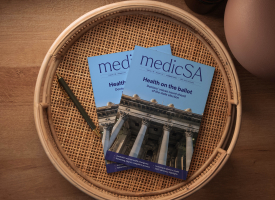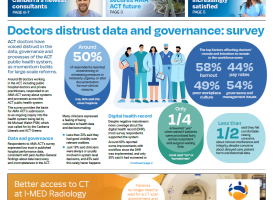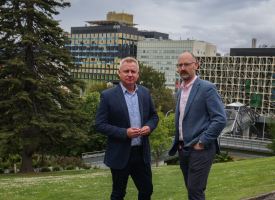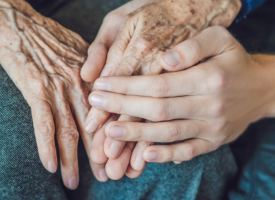Transcript - AMA President Dr Omar Khorshid on concerns "extraordinary" amount of Australians will need to be hospitalised over coming weeks with COVID-19
GLEN BARTHOLOMEW: Well, it took less than 24 hours, but National Cabinet has amended its new COVID-19 rules, further relaxing testing arrangements by removing the requirement for confirmed cases in isolation. They have to do a rapid antigen test six days after exposure. The change comes after the rules were announced on Thursday amid complaints of price gouging and limited supply of such rapid acting tests. So it means there's no obligation on positive cases to return a negative test before they end their isolation. Well, the President of the Australian Medical Association is Dr Omar Khorshid, and he joins us now. Doctor, thanks for your time.
OMAR KHORSHID: Yeah, no worries, Glen
GLEN BARTHOLOMEW: What have you made of this latest change?
OMAR KHORSHID: Well, it's quite extraordinary to see such a rapid turnaround from the Prime Minister, and it does suggest that he's received some further advice from, probably the Chief Health Officers, suggesting either that they just don't have the rapid antigen tests necessary to perform this day six test, or that they don't agree with the decision to use those tests. But either way, the decision has been overturned. And what that means is that people will be going back into the community without a negative test earlier than has ever been done before. And we're not aware of any data that actually suggests that's safe and that we won't see people going [audio skip] potentially back to their workplaces and back to other potential sources of transmission.
GLEN BARTHOLOMEW: So, if it is the former, for example, they said: listen, actually, let's remove that need for a negative test before we let them out the door because, hey, we don't have a lot of those tests. Is that really the way we should be running this?
OMAR KHORSHID: Well, a lot of the decisions in the last few days are very hard for us at the AMA to understand. There does seem to have been a fairly permissive approach to this Omicron variant on the basis that it is less severe, and it is less severe, as far as we can tell with the data we've seen. But the problem is we're just seeing so many more cases. I mean, over 20,000 today in New South Wales alone, we're doubling over the previous couple of days. That's a trajectory that's pretty scary when you take it forwards; 20,000 today might mean 50,000 in three or four days, it might be 100,000 a day, you know, in a week or two. And those are extraordinary numbers that not only the testing centres won't cope with, but the hospitals and other essential parts of our communities just won't cope with people. Even though that the furloughing rules mean that you'll have more people available, because they're not going to be called a close contact every time they've come across someone with COVID. But they might be sick themselves with COVID, or someone in their family may be sick, and it's still going to take huge numbers of workers out of the workforce and into their homes for that seven days of isolation.
GLEN BARTHOLOMEW: So again, has that change being prompted by the need to fix that other problem? To say we need to stop getting all of these workforces disrupted health care included by having to isolate as a result of our existing definitions? What do you make of this new close contact definition? Is it a bit too narrow to say you need to have been exposed to someone for four hours and only in a household setting or something akin?
OMAR KHORSHID: Yeah, well, we're already seeing some states ignore that for our timing, with South Australia coming out and saying they're sticking with 15 minutes. And certainly, there's nothing about four hours that makes any sense to us given what we know about Omicron, which is it spreads through fairly brief exposure and very, very quickly through the community. So yes, household contacts are the most likely to catch it, whether they've been vaccinated or not. But of course, anyone you come in contact with for more than a few minutes, to reasonably close contact with, is likely to be exposed, is quite likely to test positive, except they'll never know, because they won't be asked to have a test. And if they don't develop symptoms themselves, they could, of course, go around spreading the virus in the community. And that's the downside of this [audio skip]. It came from the right place, saying well, we need to protect our resources, we need to point our PCR tests at the people most likely to have a positive result. And where the result changes, what we do with them. But the downside of this move is just more cases in the community, even more pressure on the health system, the testing system, GP's, hospitals, et cetera. And cases in volumes that we've just never seen before with any communicable disease in this country. And it's pretty scary and unchartered territory.
GLEN BARTHOLOMEW: And yet we had the Intensive Care Association on earlier this week seemed very sanguine about the way things stood for them, saying: listen, there's no pressure really on us. We've had peaks bigger than this in the last 12 months. Things are going okay. Hospitalisations are continuing to grow, but again, people continue to say, and I've asked this of most people I've spoken to this week, that they didn't seem to think that hospitalisations were a concern yet.
OMAR KHORSHID: They're not a concern yet, because they're at numbers that are- in New South Wales, just a bit below the peak of the Delta outbreak. But overall, in Australia, we're now seeing more COVID cases in hospital than we've ever seen before, and they're rising at a faster rate than we've ever seen before.
GLEN BARTHOLOMEW: [Interrupts] At what point does it have to get to be of concern, is what I've been wondering?
OMAR KHORSHID: Well, exactly. It's when the beds are simply not there or the staff to look a look after those patients are simply not there, because they're all off sick with COVID, or because they're in isolation as well. And we're already seeing that lack of staff in St Vincent's Hospital in Sydney that has put out a bit of a call for help today. And we expect that other hospitals will be in a similar position in due course if numbers keep growing at this rate. And the problem is that it's an exponential growth, not just in cases, but also in hospitalisations. They're vastly lower than the cases, but they're still going up very steeply. And if that trend continues for another week or two, we're going to see extraordinary numbers of people in hospital in New South Wales.
GLEN BARTHOLOMEW: And yet the Prime Minister says this week's changes, that the health policy needs to be dynamic, and change is required. There's no point having the old settings for Delta to deal with Omicron; this is less severe. Is he right?
OMAR KHORSHID: Well, he's right that it's less severe, but I think his confidence that our hospital system will cope is not shared by the medical profession, by the nurses on the front line in New South Wales. And there's a lot of very worried people in the community who don't believe that these decisions have been taken for the right reasons, and that they're going to improve our situation in Australia. In fact, they may have the opposite impact in time. And we are worried that the only way out of this may be a lockdown once the situation becomes untenable in New South Wales. And I'm not sure what that number is when you reach that tipping point, but there must be one. Because every other country around the world that's faced a huge COVID outbreak has had to go into lockdown to terminate it, to get that curve turning the other way. That's what we're seeing in Europe, in multiple different countries. And I don't think- just because Omicron is less severe that the outcome is going to be any different in New South Wales. I hope I'm wrong, but I've got a funny feeling I'm going to be right.
GLEN BARTHOLOMEW: We'll wait and see. Dr Omar Khorshid, thank you very much. The President of the Australian Medical Association.



